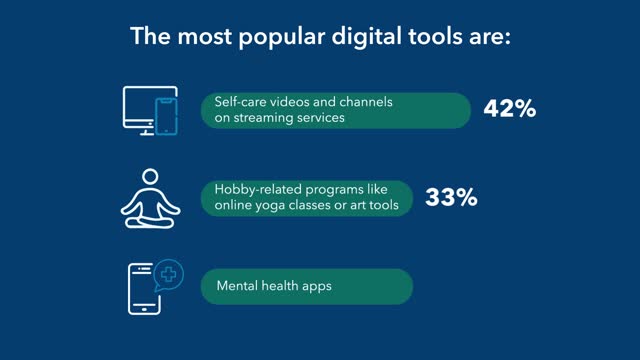Premium Only Content

A quarter of respondents are afraid of 'doing it wrong' when it comes to their self-care
More than three-fourths of Americans have increased their use of digital tools that support their mental health during the pandemic, new research suggests.
In a recent survey of 2,003 respondents, 76% said the stress of the public health crisis had inspired them to practice self-care more than they had before.
Among the tools respondents find most effective for improving their mental well-being are self-care videos and channels on streaming services (42%), hobby-related programs like online yoga classes or art tools (33%) and use of mental health apps (also 33%).
Conducted by OnePoll on behalf of Kaiser Permanente, the survey also found that 48% of people who practice mental-health self-care are seeking ways to positively cope with emotional distress related to anxiety, depression and anger.
Forty percent named financial challenges as the concern they wanted to address. Some 39% cited health concerns, and 37% noted difficulties with family and friends as a source of worry.
Other concerns identified by respondents include loneliness and social challenges (35%), problems with intimate relationships (33%), concerns about the COVID-19 pandemic (33%) and other current events (29%), and worries about work and school (26%).
To help manage their mental load, 57% meditate regularly as part of their self-care routine, for an average of two hours a week.
That works out to about 18 minutes a day — or 109 hours a year, when taken cumulatively.
Respondents cited numerous benefits from these meditation sessions, including improved focus (60%), improved sleep (57%), better emotional control (51%) and better sex (42%).
About half of the people surveyed said they’ve looked for ways to manage substance use within the past two years.
The self-care tools they’ve found most beneficial for achieving this include meditation apps (52%), in-person therapy (45%) and virtual therapy (43%).
“The events of the past several years, including the COVID-19 pandemic, have clearly taken a toll on our emotional well-being,” said Cosette Taillac, LCSW, vice president for Mental Health and Wellness at Kaiser Permanente. “Digital self-care tools for mindfulness, meditation and cognitive behavioral therapy can help boost resilience and offer useful and accessible self-help tools for people experiencing emotional distress.”
Although more than half of respondents expressed an interest in improving their mental health with new digital tools, some are still hesitant to do so.
Forty-two percent said these tools seem complicated, while 41% are concerned about their privacy online or don’t think digital tools will be as effective as real-life tools.
And a quarter of respondents are afraid of “doing it wrong.”
“Digital self-care tools are not meant to take the place of care from a skilled mental health clinician,” Taillac said. “But evidence-based apps can complement that care and support overall emotional well-being. That’s especially true when the app has been vetted and recommended by a trusted health care provider, making it more likely that patients will feel comfortable using the resource.”
MOST POPULAR FORMS OF MENTAL HEALTH SELF-CARE
Exercise 58%
Get more rest/sleep 54%
Listen to music 48%
Eat healthy foods 45%
Meditate/do yoga 43%
ENDS
-
 1:03
1:03
SWNS
2 days agoMost Americans love the adventure of holiday driving
9 -
 3:38
3:38
The Post Millennial Live
4 years agoJim Jordan tells AG Garland: Americans are afraid of their government
19.3K1 -
 LIVE
LIVE
The Quartering
1 hour agoThere's An OnlyFans For Pedos, SNAP Bombshell & Big Annoucement
1,596 watching -
 2:24:29
2:24:29
The Culture War with Tim Pool
2 hours agoMAGA Civil War, Identity Politics, Christianity, & the Woke Right DEBATE | The Culture War Podcast
155K86 -
 LIVE
LIVE
Side Scrollers Podcast
2 hours agoVoice Actor VIRTUE SIGNAL at Award Show + Craig’s HORRIBLE Take + More | Side Scrollers
641 watching -
 LIVE
LIVE
The Charlie Kirk Show
1 hour agoCreeping Islamization + What Is An American? + AMA | Sedra, Hammer | 11.21.2025
2,726 watching -
 LIVE
LIVE
Sean Unpaved
1 hour agoWill Caleb Williams & Bears WIN The NFC North? | UNPAVED
107 watching -
 LIVE
LIVE
Lara Logan
3 hours agoSTOLEN ELECTIONS with Gary Berntsen & Ralph Pezzullo | Ep 45 | Going Rogue with Lara Logan
350 watching -
 1:47:18
1:47:18
Steven Crowder
4 hours agoTo Execute or Not to Execute: Trump Flips the Dems Sedition Playbook Back at Them
246K242 -
 16:11
16:11
RealMetatron
19 hours agoHasan Piker got HUMBLED in New York
7.43K4